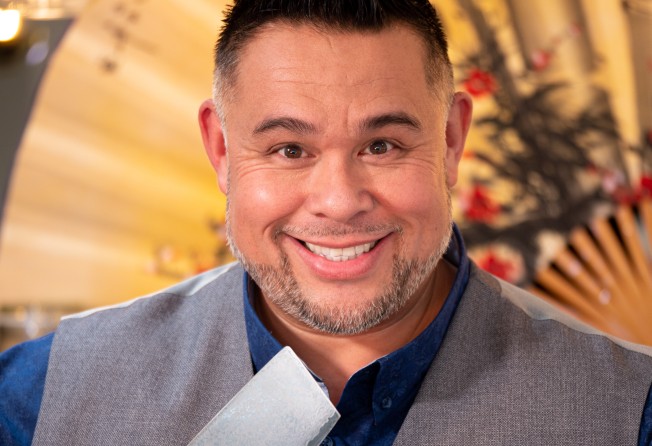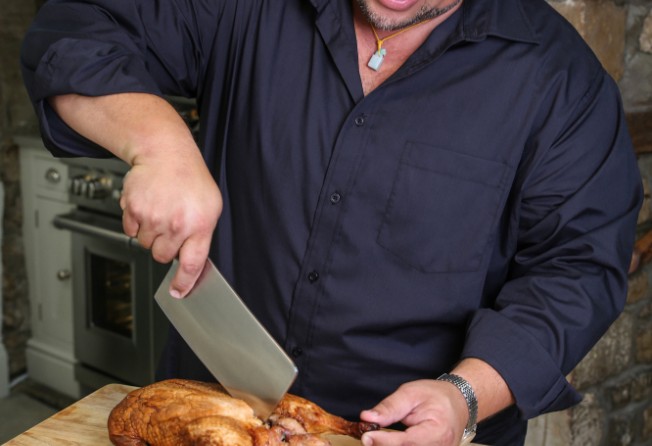He teaches Bruce Lee-style kung fu, and cooking on Amazon Prime: meet Kwoklyn Wan, star of Kwoklyn’s Chinese Takeaway Kitchen
- Wan’s cooking career began as a child – he would wash up or pour drinks behind the bar at his family’s Chinese restaurant in the British city of Leicester
- Now he has a deal for five cookery books, an upcoming Amazon Prime show, and has his eye on hosting live cooking competitions in future

If you’ve ever doubted that Chinese takeaway cuisine packs a punch, then meet a living blend of fight and flavour: Kwoklyn Wan, the man who puts the stomp kick into king prawns, Hong Kong style, and the chop into chop suey.
Not that genial giant Wan projects an intimidating air – except perhaps when sparring (more on that later). In fact, the affable British-Chinese chef has graduated from making quick, cook-along, everybody-welcome Instagram and YouTube clips in his kitchen – or while sporting a padded body warmer in his draughty garage – to a fully realised Amazon Prime show in short order.
That Wan is where he is and potentially headed for television-chef stardom is down to the decisions of his grandfather, who fled war-ravaged China for Hong Kong’s New Territories, where the path to Kwoklyn’s Chinese Takeaway Kitchen (series one, streaming soon) starts in the border village of Tam Shui Hang, his forebear’s adopted home.
Having moved to the English Midlands in Britain in the 1950s, Wan’s grandfather opened the first Chinese restaurant in the city of Leicester, The Hung Lau, in 1962.
“All the big celebrities playing at [performance venue] De Montfort Hall would come,” reveals Wan. “The Beatles called in 1964 and signed their names on the wall – which was eventually painted over. I don’t think Grandad knew who they were.
“When he died in 1970, my dad and uncle took over the restaurant,” says Wan, in a video call from Leicester, his hometown.
“In 1978, Dad opened the city’s first dedicated Cantonese restaurant, The Bamboo House, and hired a couple of chefs from London. Back then, all the Cantonese chefs in the country were based there – which was crazy, because if you wanted a hot and sour soup or something a bit different, you had to go to London or, then, come to my dad’s!”
Wan’s own career began early, at another family establishment. “We went to The Bamboo House as children, especially during the holidays – the storeroom was our playground. But Mum and Dad wanted a restaurant with living accommodation above, so they bought The Panda,” he says.
“It had an internal phone system, so whenever they were too busy downstairs they’d ring up and say, ‘You’ve got to come down and help!’, whether it was washing up or working behind the bar, even as kids, pouring drinks.”

Today, the focus is different. “Wantons, our cafe bar, opened here a few years ago, but we’ve become so busy with media work we only accommodate supper clubs and private events. It’s Hong Kong street food – dumplings, bao, noodles – fast, dai pai dong style, no fancy dishes,” says Wan.
“It was about five years ago that I thought, ‘You know what, I want to share my experiences of Mum and Dad’s restaurants’, so a cookbook was pitched. My agent managed to get a book deal; that turned into a two-book deal, then three, then five.” Book four is now being written.
“Through lockdown, I thought I’d share some recipes on YouTube. I’d done food festivals and live television before – I like the showman thing, being on stage and teaching people to cook. But it was only in April last year that we were approached about an Amazon Prime show and began creating Kwoklyn’s Chinese Takeaway Kitchen.”
Wan was “most recently in Hong Kong three years ago. We planned to go last year” he says, “then Covid-19 kicked in”.
But when he does return, it will be for more than the customary family holiday with the relatives, some of whom are still in Tam Shui Hang. “The first few books were for a Western audience and feature takeaway favourites – sweet and sour, sweetcorn soup. The Chinese market is obviously different, even though it’s Cantonese cuisine,” he says.
“So we’ve written another television show, with another production company, in which we’ll go to Hong Kong and look at how those dishes originated there and on the mainland, then found their way to Britain.”
The beauty of Chinese food is that it’s almost instantaneous: chop ingredients, throw into wok – and you’ve got a dish
He has chosen a crowded television market, so what makes Wan’s show different? “I try to position myself as an authority on Chinese cuisine in Britain,” he says. “Whether or not I can extend that to Asia … we’ve got some good ideas, interactive and immersive, and that makes a big difference between watching someone cook and being drawn into the story of a dish yourself.
“And I try to make it all doable. I used to love watching Heston Blumenthal, but I’m thinking, ‘Would I really spend three days trying to roast a chicken? Probably not.’ You need to do a bit of forward thinking and preparation, but the beauty of Chinese food is that it’s almost instantaneous: chop ingredients, throw into wok – and you’ve got a dish.”
Still undimmed, despite recent events, is Wan’s passion for his other area of expertise. “I’m a kung fu instructor,” he says. “I’m wing chun trained and taught at a Bruce Lee Family event in London in 2008. Later, I went into jeet kune do.
“It’s just like cooking. Lee was a big fan of removing certain aspects to make moves effective immediately; so why do three things when you can do one for the same outcome?
“That’s what I’m trying to get across – it’s easy just to add a handful of decent, authentic ingredients. And if you’re going to cook Chinese food and you want it to taste like Chinese food, you must use Chinese ingredients.”
As for the close combat: “My martial arts school has been pretty much closed since last March, but I still have it,” he says. “I’m not as active as I used to be, but I still love it, still get a buzz, even now. I started when I was four and I’m 48 this year!”
As normality slowly returns and Wan’s schedule quickly fills, confrontation won’t be on the menu, but competition will.
“We’re hoping to film two more series this year,” he says, “and next year look at live cooking events with a small audience – and guests! I like challenges for guests; maybe we’ll have a wok-off!”